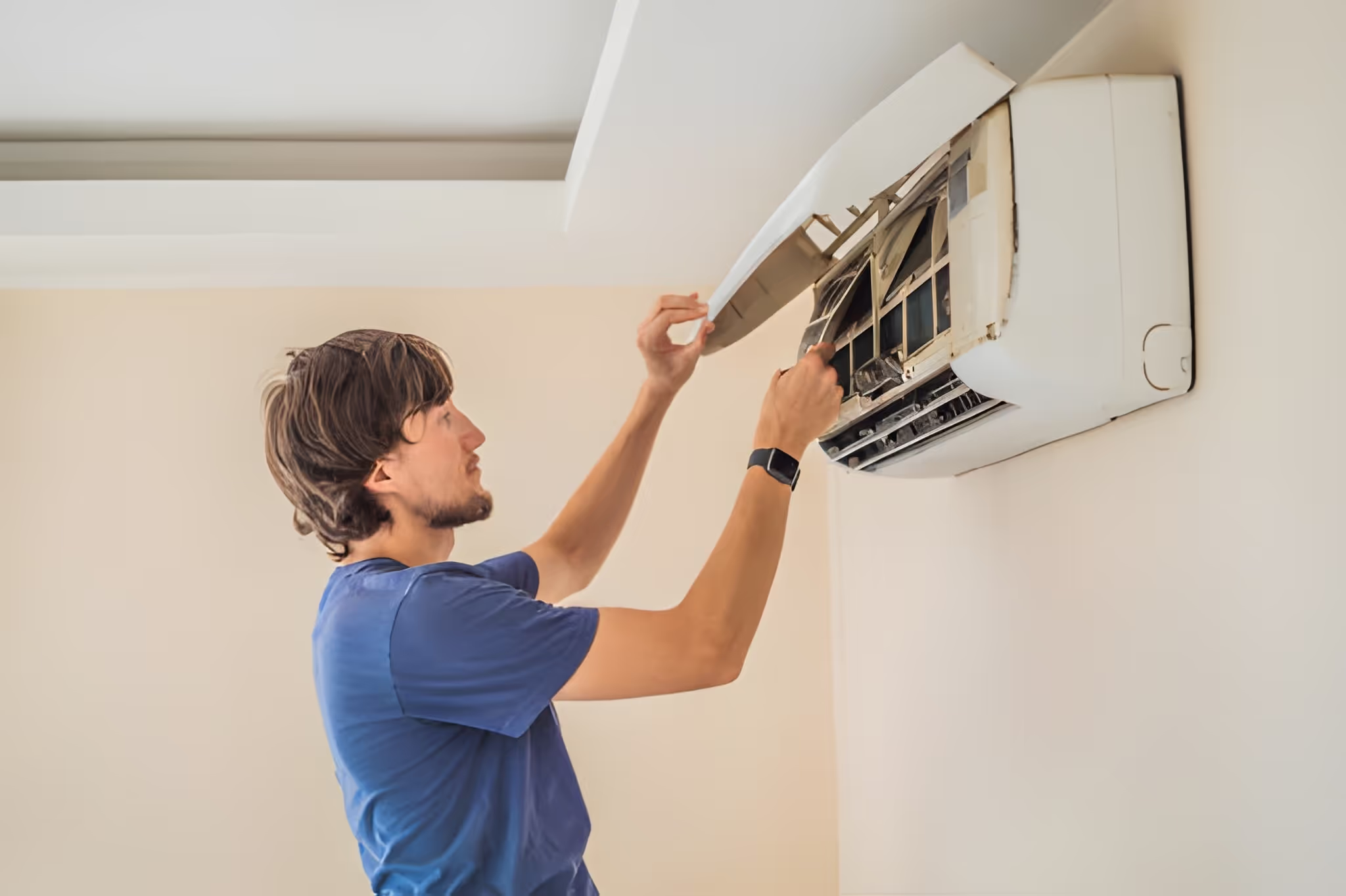Mini Split Maintenance in Coppell, TX
Mini Split maintenance in Coppell, TX is essential for keeping ductless systems efficient, reliable, and long-lasting in a climate that sees hot, humid summers and occasional winter cold snaps. Proper, seasonal care prevents common failures, preserves inverter compressor health, maintains indoor air quality, and helps homeowners avoid sudden breakdowns during peak cooling months.

Common Mini Split issues in Coppell homes
- Dirty or clogged filters leading to reduced airflow and higher energy use. Coppell’s spring pollen and summer dust make filter clogging a frequent problem.
- Reduced cooling capacity from dirty evaporator or condenser coils. Humidity accelerates coil fouling and bacterial growth.
- Refrigerant leaks or low charge that cause the system to short-cycle or run longer without reaching setpoints.
- Electrical or control faults affecting the outdoor inverter or indoor control boards, sometimes triggered by summer power fluctuations.
- Blocked condensate drains and secondary drain pan issues that can cause water damage inside wall cavities or under units.
- Outdoor unit exposure problems, including debris, vegetation growth, and weather-related wear to mounting hardware and fins.
What Mini Split maintenance plans include
A comprehensive Mini Split maintenance plan tailored for Coppell systems typically covers the following seasonal inspections and services:
- Filter cleaning and replacement
- Remove, clean, and/or replace washable filters. Advise on replacement frequency for disposable filters based on home conditions and occupancy.
- Explain effects of pollen and pet dander common in Coppell neighborhoods.
- Indoor coil cleaning
- Inspect and gently clean evaporator coils to restore heat transfer and prevent mold growth in humid months.
- Apply coil-safe cleaners when needed to remove scale, dust, and residue.
- Outdoor condenser coil and fan inspection
- Clean condenser fins and remove debris. Check fan motor operation and blade condition.
- Verify outdoor unit clearance from plants, mulch, and lawn equipment typical in Coppell yards.
- Refrigerant and leak checks
- Measure system pressures and temperatures. Inspect all visible connections for signs of oil or dye indicative of leaks.
- Recommend repair of leaks and proper refrigerant charge to manufacturer specifications to protect inverter compressors.
- Electrical and control system tests
- Test capacitors, contactors, fuses, disconnects, and wiring for wear or corrosion.
- Verify thermostat and remote control communications, sensor calibration, and control board operation.
- Drainage and condensate management
- Clear condensate lines, flush drain pans, and inspect secondary pans and safety switches to prevent water damage.
- Check for proper slope and trap condition in line runs inside walls common to Mini Split installs.
- Performance tuning and airflow balancing
- Measure supply and return temperatures, evaluate zone performance, and adjust airflow or settings to optimize comfort and efficiency.
- Review airflow patterns for each head in multi-zone systems and recommend minor repositioning or airflow adjustments.
- Operational verification in heating and cooling modes
- Run system through cooling and heating cycles (for heat pump Mini Splits) to ensure reliable performance across seasons.
- Confirm defrost cycle operation where applicable for winter performance.
- Run system through cooling and heating cycles (for heat pump Mini Splits) to ensure reliable performance across seasons.
Diagnostic process — what to expect during a maintenance visit
- Visual inspection of outdoor and indoor units for physical damage, debris, and mounting stability.
- Remove and clean filters; inspect coil surfaces and return grills.
- Electrical tests: voltage, amperage, and continuity checks on major components.
- Refrigerant system evaluation: static and loaded pressures, subcooling, and superheat readings for inverter systems.
- Drainage check and condensate system flush.
- Control and thermostat verification; test remote sensors and schedule settings.
- Final performance run and documentation of findings and any recommended repairs.
Typical repairs and solutions handled during maintenance
- Refrigerant leak repair and recharge following leak detection.
- Replacement of worn capacitors, contactors, or run capacitors that threaten compressor health.
- Cleaning or replacement of fan motors and blower assemblies.
- Repair or reprogramming of remote controls and wall controllers, plus firmware updates when available.
- Coil repair, fin straightening, and minor fabrication for mounting or weather damage.
Benefits of ongoing Mini Split maintenance agreements in Coppell
- Improved efficiency that lowers energy use during Coppell’s lengthy cooling seasons.
- Extended equipment life by reducing compressor stress and wear on electrical components.
- Fewer emergency repairs and reduced downtime during hot months when cooling is most critical.
- Warranty protection and documentation that many manufacturers require for labor warranty compliance.
- Priority scheduling during seasonal peaks and predictable service visits for homeowners with multiple zones.
- Detailed service records and diagnostic reports that help with long-term system planning.
Recommended scheduling options for Coppell systems
- Annual Tune-Up: Minimum once per year for light-use properties or single-head systems.
- Biannual service (spring and fall): Recommended for Coppell homes with heavy summer cooling needs, multi-zone systems, or units used for both heating and cooling.
- Pre-summer inspection: Prioritize coil cleaning and refrigerant checks before peak cooling season begins.
- Pre-winter check: Verify heat pump functionality and defrost performance in late fall.
Practical maintenance tips between visits
- Clean washable filters every 2 to 4 weeks during heavy pollen and summer months.
- Keep at least 2 feet of clearance around outdoor units and remove mulch or grass clippings.
- Check indoor drip pans occasionally for water or odors.
- Replace disposable filters according to manufacturer guidance and household conditions.
Regular Mini Split maintenance in Coppell, TX protects comfort, improves indoor air quality, and keeps operating costs predictable. Seasonal inspections, timely coil and filter service, leak and electrical checks, and performance tuning are the core tasks that prevent most failures and maximize the lifespan of ductless systems in this region.

Flexible Financing Options
Explore our range of flexible financing options designed to suit your needs and budget.













